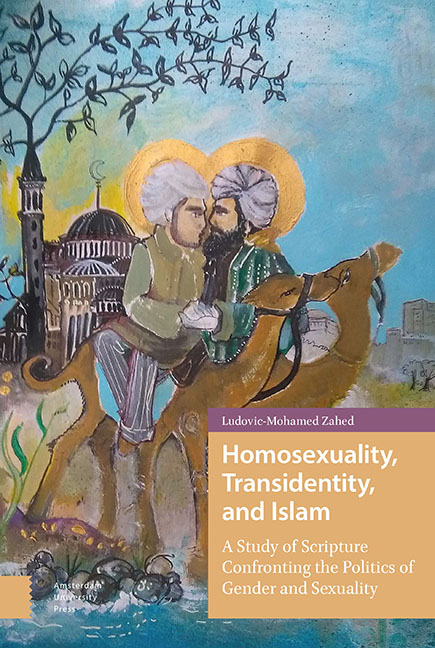 Homosexuality, Transidentity, and Islam
Homosexuality, Transidentity, and Islam Book contents
- Frontmatter
- Contents
- List of Figures
- Acknowledgments
- Foreword
- Introduction
- I The Qur’anic Ethics of “Nature”: Gender, Sexuality, and Diversity
- II Distressing Qur’anic Verses?
- III The Prophet: A Living Incarnation of Qur’anic Ethics
- IV Islamic Apocrypha Advocating the Stoning of “Sodomites”
- V Postcolonial Orientalisms
- VI “Abnormals”: From Cultural Diversity to Dogmatic Uniformity
- VII Towards a Structural Reevaluation of Cultural Values
- VIII Pan-Arabist Literary and Identity Censorship
- IX Orientalist Shi’ism and Literary Homoeroticism
- X Homonationalism and Performative Sexual Categorization
- XI A “Crisis” of Categories, Geopolitics or Civilization
- Conclusion
- Afterword
- Bibliography
- Index
III - The Prophet: A Living Incarnation of Qur’anicEthics
Published online by Cambridge University Press: 20 November 2020
- Frontmatter
- Contents
- List of Figures
- Acknowledgments
- Foreword
- Introduction
- I The Qur’anic Ethics of “Nature”: Gender, Sexuality, and Diversity
- II Distressing Qur’anic Verses?
- III The Prophet: A Living Incarnation of Qur’anic Ethics
- IV Islamic Apocrypha Advocating the Stoning of “Sodomites”
- V Postcolonial Orientalisms
- VI “Abnormals”: From Cultural Diversity to Dogmatic Uniformity
- VII Towards a Structural Reevaluation of Cultural Values
- VIII Pan-Arabist Literary and Identity Censorship
- IX Orientalist Shi’ism and Literary Homoeroticism
- X Homonationalism and Performative Sexual Categorization
- XI A “Crisis” of Categories, Geopolitics or Civilization
- Conclusion
- Afterword
- Bibliography
- Index
Summary
Abstract
This chapter presents a detailed and systematicanalysis of the metaphorical verses in the Qur’anto determine the Prophet of Islam's attitudetowards – what we would call today – sexualminorities.
Keywords: prophetic tradition,sexual minorities, transidentity, genderdiversity
Apart from these verses in the Qur’an, queer FrenchMuslims also often ask me about the attitude of theProphet of Islam towards those we would call todaygender and sexual minorities. According to a hadith,the Prophet, whose individual ethics, according tohis wife Aisha, corresponded exactly to theQur’an’s, was once walking with another man. When athird man passed by, the former said: “O messengerof God, I love this man!” To which the Prophetreplied: “Have you told him of how you feel?” Theman replied by saying no. The Prophet then said:“Tell him.” And the man went after his companion totell him: “I love you by the grace of Allah.” Andhis companion replied: “May Allah love you for thelove that you have for me, by the grace of God”(Sunan Abu Dawud, 5125). Would the Prophet haveencouraged a man to declare his love for anotherman, if he were the misogynistic and homophobicleader described by numerous dogmatic Muslims?Conversely, would such a man, as described in theIslamic tradition, have allowed two men who loveeach other to be condemned to death?
Was the Prophet Homophobic andTransphobic?
In order to respond to such questions, Islamic legalscholars have developed more or less elaboratetechniques to establish the traceability ofprophetic traditions, with the goal of establishing,as it were, the level of risk in considering aparticular tradition as authentic or apocryphal.
The two principal elements studied by hadith scholars,over the centuries and up till the present, are thematan – the contentsof the oral tradition – and the isnad – the chain of narrators whotransmitted, from generation to generation, thisoral tradition (see Figure 1). The problem is thatthe matan often variesfrom one narrator to another (this is the syndromeof the “téléphonearabe”) and that the isnad is not always composed oftrustworthy individuals.
- Type
- Chapter
- Information
- Homosexuality, Transidentity, and IslamA Study of Scripture Confronting the Politics of Gender and Sexuality, pp. 33 - 44Publisher: Amsterdam University PressPrint publication year: 2019


